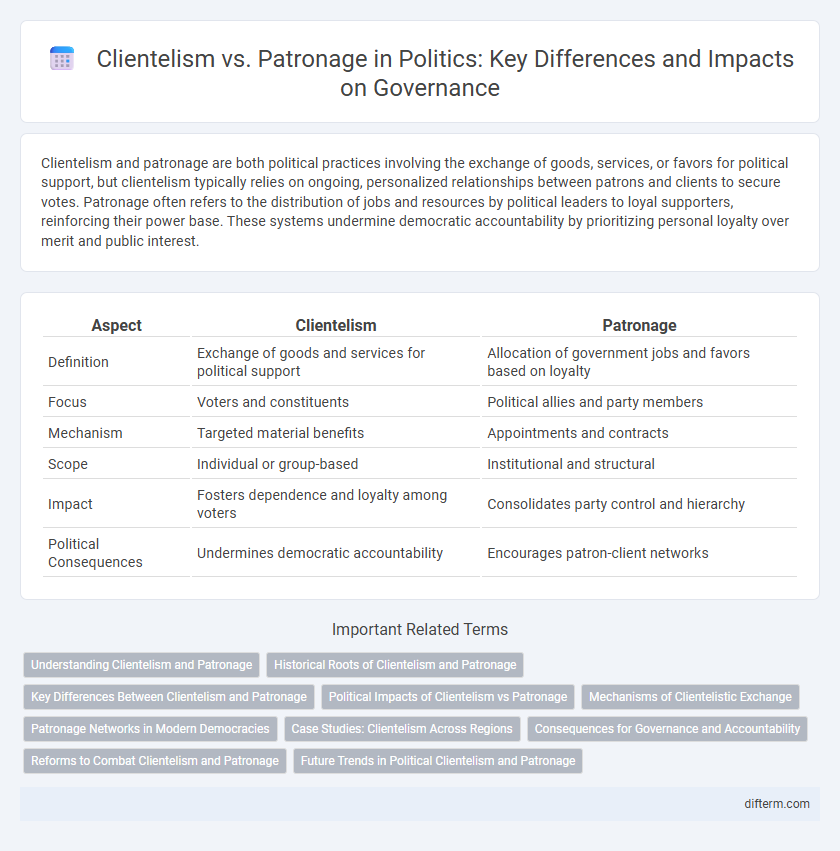Clientelism and patronage are both political practices involving the exchange of goods, services, or favors for political support, but clientelism typically relies on ongoing, personalized relationships between patrons and clients to secure votes. Patronage often refers to the distribution of jobs and resources by political leaders to loyal supporters, reinforcing their power base. These systems undermine democratic accountability by prioritizing personal loyalty over merit and public interest.
Table of Comparison
| Aspect | Clientelism | Patronage |
|---|---|---|
| Definition | Exchange of goods and services for political support | Allocation of government jobs and favors based on loyalty |
| Focus | Voters and constituents | Political allies and party members |
| Mechanism | Targeted material benefits | Appointments and contracts |
| Scope | Individual or group-based | Institutional and structural |
| Impact | Fosters dependence and loyalty among voters | Consolidates party control and hierarchy |
| Political Consequences | Undermines democratic accountability | Encourages patron-client networks |
Understanding Clientelism and Patronage
Clientelism involves a reciprocal relationship where patrons provide goods or services to clients in exchange for political support, often embedded in a system of unequal power distribution. Patronage refers to the allocation of resources or positions by political leaders to loyal supporters, reinforcing networks of influence and control within political institutions. Both practices undermine democratic accountability by prioritizing personal loyalty over policy effectiveness and public interest.
Historical Roots of Clientelism and Patronage
Clientelism and patronage have deep historical roots tracing back to ancient political systems, where reciprocal relationships between patrons and clients structured social and political hierarchies. In ancient Rome, patrons provided legal protection and economic benefits to clients in exchange for political support, establishing networks of mutual obligation that shaped governance. These practices evolved through feudal Europe, reinforcing power dynamics through land-based loyalty, and persist in modern politics by influencing electoral behavior and party allegiance.
Key Differences Between Clientelism and Patronage
Clientelism involves reciprocal relationships where goods or services are exchanged for political support, typically on a mass scale, while patronage centers on granting jobs or favors from a position of power to individuals or groups as political rewards. Clientelism relies heavily on ongoing, negotiated exchanges and includes a broader network of beneficiaries, whereas patronage is characterized by direct allocation of resources and appointments, often without explicit negotiation. The key distinction lies in clientelism's emphasis on sustained voter loyalty through personalized exchanges versus patronage's focus on consolidating elite power through strategic distribution of benefits.
Political Impacts of Clientelism vs Patronage
Clientelism undermines democratic institutions by fostering dependency relationships that skew political representation and resource distribution toward loyalist groups, thereby eroding transparency and accountability. Patronage, while sometimes stabilizing political alliances, often perpetuates corruption and inefficiency by prioritizing loyalty over meritocracy in public appointments. Both systems distort electoral competition, weaken institutional trust, and contribute to unequal access to public goods, significantly impacting governance quality.
Mechanisms of Clientelistic Exchange
Clientelistic exchange operates through a direct, reciprocal relationship between patrons and clients, where political support is exchanged for material benefits or services. This mechanism relies on personalized interactions, often involving targeted allocation of resources, such as jobs, welfare, or favors, to ensure voter loyalty. The effectiveness of clientelism depends on information asymmetry and the ability to monitor and enforce these exchanges within local networks.
Patronage Networks in Modern Democracies
Patronage networks in modern democracies function as strategic systems where political leaders allocate resources, jobs, and favors to supporters in exchange for loyalty and votes, fundamentally shaping electoral outcomes and governance. These networks often blur the lines between formal institutions and informal practices, fostering dependency that can undermine meritocratic principles and institutional transparency. The persistence of patronage is intricately linked to party system fragmentation and weak institutional checks, affecting policy implementation and democratic consolidation.
Case Studies: Clientelism Across Regions
Clientelism manifests uniquely across regions, exemplified by vote-buying networks in Latin America and social service exchanges in Southeast Asia. In Southern Europe, patronage often intertwines with political party loyalty, reinforcing hierarchical power structures. African case studies highlight how clientelist arrangements adapt to local economies and kinship systems, shaping electoral outcomes and governance practices.
Consequences for Governance and Accountability
Clientelism undermines governance by fostering dependency through the exchange of goods and services for political support, weakening institutional accountability and transparency. Patronage distorts public service delivery by prioritizing loyalty over competence, leading to inefficiency and corruption within governmental institutions. Both practices erode democratic processes, diminish public trust, and hinder the development of merit-based, responsive governance systems.
Reforms to Combat Clientelism and Patronage
Reforms to combat clientelism and patronage center on enhancing transparency, enforcing strict anti-corruption laws, and promoting merit-based public sector recruitment. Implementing digital governance and open data platforms reduces opportunities for quid pro quo exchanges by increasing accountability. Strengthening civil society participation and electoral oversight mechanisms further curtails patronage networks and fosters democratic integrity.
Future Trends in Political Clientelism and Patronage
Emerging digital technologies are reshaping political clientelism and patronage by enabling more sophisticated data-driven targeting and personalized distribution of resources. Social media platforms increasingly facilitate direct communication between politicians and voters, enhancing micro-level patronage networks. Future trends suggest a shift towards hybrid models combining traditional patronage with algorithmic precision in clientelist exchanges.
clientelism vs patronage Infographic

 difterm.com
difterm.com